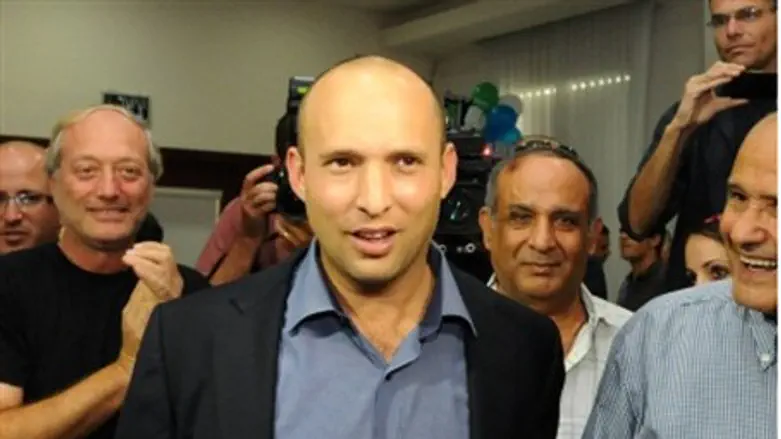
Yisrael Beytenu chairman Avigdor Lieberman met on Thursday in Tel Aviv with the chairman of the Bayit Yehudi (Jewish Home) party, Naftali Bennett.
The two reportedly discussed the options relating to the formation of the next government and the issue of achieving equal burden in army and national service among all Israelis. They agreed to continue the dialogue between them.
The Jewish Home went up from three seats to 12 seats in last week’s election. While there is tension between Bennett and Prime Minister Binyamin Netanyahu, officials in the Likud rejected this week the claims that this tension would lead to the Jewish Home’s being left out of the coalition. Lieberman’s meeting with Bennett may be an indication of this.
Lieberman has long advocated for a law that would see all Israelis, including yeshiva students and Arabs, being drafted into the army or performing national service. Bennett has indicated he would support this as well, and the issue is also a major part of the platform of Yesh Atid, which will be the Knesset's largest party.
Earlier on Thursday, Bennett led a delegation on behalf of his party to President Shimon Peres’s home, where he recommended that Netanyahu should form the next government.
The delegation, in addition to Bennett, also included MK elects Shuli Muallem, Yoni Shetbon and Zevulun Kalfa.
In total, 80 elected MKs have recommended to Peres that Netanyahu be the one to form the next government. The parties that recommended Netanyahu are the Likud Beytenu, Yesh Atid, Jewish Home, Shas, United Torah Judaism, and Kadima.
The Labor party, Tzipi Livni’s Hatnua and Meretz chose to recommend no one.
As a result of the large support for Netanyahu, Peres is expected to give him the go-ahead to begin official coalition negotiations and form a new government. This is expected to officially happen on Saturday night.
In Israel's parliamentary system, the President is supposed to “nominate” the head of one of the parties in the Knesset to form a government. That candidate then attempts to work out a coalition deal with the heads of other parties, until he is able to get parties representing at least 61 Knesset members to agree to form a government. At that point, the Knesset votes on forming the government, and the candidate the President nominated becomes Prime Minister.